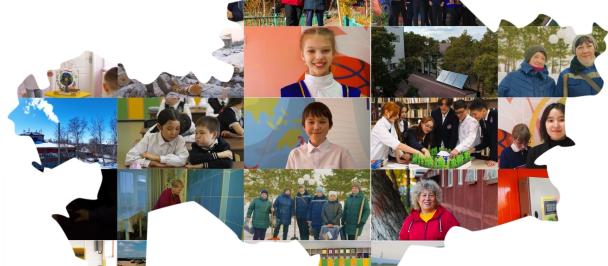Public in Kazakhstan champions government development of renewable energy sources
February 22, 2023

In Kazakhstan over 90 percent of the public supports the government’s move to transition to renewable energy sources, according to the United Nations Development Programme (UNDP) in Kazakhstan. This finding was presented as part of results of a UNDP sociological survey on public awareness in Kazakhstan regarding the development of renewable energy sources (RES).
Low-carbon development is a prerequisite for sustainable development and is aimed at preventing the catastrophic consequences of global climate change. Today, some countries have adopted goals to achieve carbon neutrality, and Kazakhstan, for its part, has adopted a Strategy aimed at achieving carbon neutrality by 2060.
As part of the project, "De-risking Renewable Energy Investments", UNDP, jointly with the Ministry of Energy, with funding from the Global Environment Facility (GEF), has conducted a public awareness survey on the implementation of RES.
The survey involved 2,546 respondents from all regions of Kazakhstan, including representatives of business, academia, entrepreneurs’ associations and RES experts.
The results show that education plays a key role in raising awareness about renewable energy. The experts suggest improving educational programmes both in school curricula and in supplementary education in the field of renewable energy, for example, by developing training programmes for workers, engineers, managers, young designers, among others.
The survey found significant differences in awareness between men and women. Women are significantly less involved in the implementation of the "green" agenda, although the renewable energy sector is more attractive to women due to its interdisciplinary nature. Another point that emerged was that women make up less than 30 percent of the renewable energy sector workforce in Kazakhstan. Their representation in decision-making is also several times lower.

A total of 83 percent of people in Kazakhstan know about RES and feel very connected to the environmental agenda; 76 percent of respondents agree that human activities are the main cause of climate change. The survey results found that 75 percent of respondents support the idea that humanity should shift to a world powered entirely by RES.
Respondents deem solar and wind energy to be the most promising energy sources in their regions. A niche popularity exists for solar water heaters (most notably in the Kyzylorda region) and for biomass use (mostly in the Abay region).


Twelve percent of people in Kazakhstan already use some of the renewable energy sources in their households for various reasons.The most important reasons cited by respondents were their desire to protect nature and to save money on electricity bills, while others had to resort to RES due to the lack of other sources.
The survey results show that the public supports a gradual energy transition in the country, where RES is seen as a strategic goal and natural gas as an interim solution.
One of the documents already approved, the Concept for Electricity Sector Development by 2035, lists goals the increase of the capacity of RES plants to 7 GW by 2030as one of its key goals. The share of RES in total electricity generation is expected to reach 15 percent by 2030 and 50 percent by 2050.

In total, 91 percent of respondents support government involvement in the development of RES. Another 47 percent have heard something about government actions to develop RES, and 21 percent of respondents could recall specific initiatives. According to experts, this is a high figure for such a new industry.
However, promoting the use of RES in the energy sector comes with certain costs to the economy and society. These include the high cost of energy generated by RES compared to energy costs from traditional sources; the transition to clean energy would require a large-scale transformation of the entire energy infrastructure; and the dependence of energy production on weather would require the creation of a system of backup and storage capacity.
Experts expect the cost of the transition to RES, the increase in energy costs and the potential increase in unplanned power outages during the period of energy infrastructure reconstruction will face public criticism. In turn, the majority of respondents indicated that energy producers and consumers should not be pressured into making this transition; rather the move should be made via incentives involving a soft, voluntarist approach.
The survey found that most people in Kazakhstan cited the internet as their main source of information about RES. However, traditional media remains a very important source of information in remote regions and in smaller communities.

 Locations
Locations



